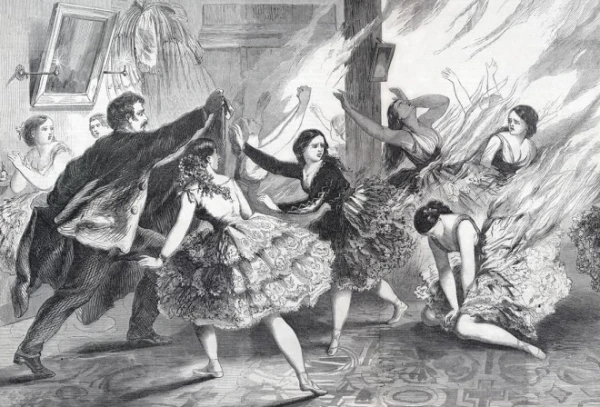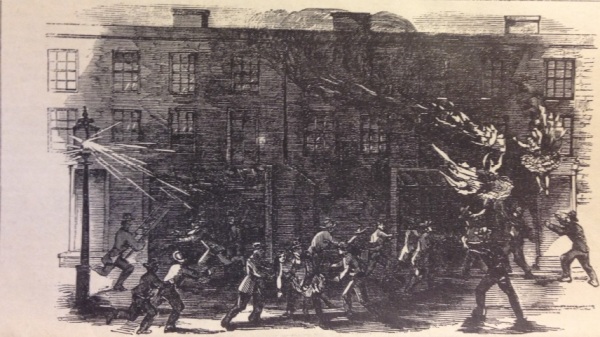In late August, 1861, William Wheatley signed the lease for the Continental Theater in Philadelphia. William Wheately was an old theatrical hand given to tried and true classic performances. For his first production he announced that the theater would be putting on The Tempest in ballet form. From England, Wheatley imported a special effects expert, as well as four ballet dancing sisters, the beautiful Gales – Ruth, Zela, Hannah, and Adeline. Six other chorus dancers rounded out the ballet troupe. On the night of September 14, 1861, the cast only made it through The Tempest’s first act.
For those unfamiliar with the niceties of Shakespearean ballet, while the seas rage at the end of the first act, the entire ballet company must quickly change into gauzy costumes so as to be ready to welcome Alonso and the rest of shipwreck victims onto Prospero’s Island. At the Continental Theater the dressing rooms were above the stage itself, necessitating a fifty foot climb up a rickety flight of stairs. The chorus received their own dressing room, complete with lighting by means of gas jets close to the mirror, where their light could be reflected and doubled – if you look at the picture above, you’ll see the gas jets off to the top left.
Above the mirror, Ruth Gale had hung her dress for the second act. While on the stage Miranda was falling instantly and madly in love with Ferdinand, Ruth hadn’t even begun her costume change, and climbed on the back of the settee to pull down her dress. The hem touched the gas jet, and instantly Ruth’s clothes were ablaze. Screaming, Ruth ran through the room, setting her sisters’ clothes ablaze like a firebrand. Insane with terror, Ruth ran against a plate glass mirror, shattering it and lacerating herself horribly.
Panicking, and on fire themselves, Ruth’s sisters plunged out the window and onto the street below, which was filled with pedestrians now under bombardment from flaming, screaming ballerinas who fell to earth with sickening thuds and the crack of broken bones.
The Gale sisters weren’t the only ones ablaze. A Miss McBride, another member of the chorus, came running across the stage with her dress ablaze, with piercing and unholy screams, and fell into the pit where the stage crew simulated the storm that gave its name to the play. Tearing the cloths which represented the waves, they managed to smother the flames. Wheatley ordered the curtain brought down, and asked the audience to leave the theater peacefully. The remaining flaming ballerinas were extinguished.
Over the next four days, the six ballerinas perished of their burns including all the Gale sisters. With no anesthetic or pain killer but brandy, and with physicians having only a rudimentary understanding of burn treatment and infection, their agony must have been severe. Wheatley was exonerated of any wrongdoing, and erected a monument to the perished ballerinas at Mount Moriah Cemetery in Philadelphia. The inscription on the stone is barely legible now, but the New York Clipper preserved it. It reads:
IN MEMORIAM
Stranger, who through the city of the dead
With thoughtful soul and feeling heart may tread,
Pause here a moment – those who sleep below
With careless ear ne’er heard a tale of woe:
Four sisters fair and young together rest
In saddest slumber on earth’s kindly breast;
Torn out of life in one disastrous hour,
The rose unfolded and the budding flower:
Life did not part them – Death might not divide
They lived – they loved – they perished, side by side.
O’er doom like theatre let gentle pity shed
The softest tears that mourn the early fled,
For whom – lost children of another land!
This marble raised by weeping friendship’s hand
To us, to future time remains to tell
How even in death they loved each other well.

